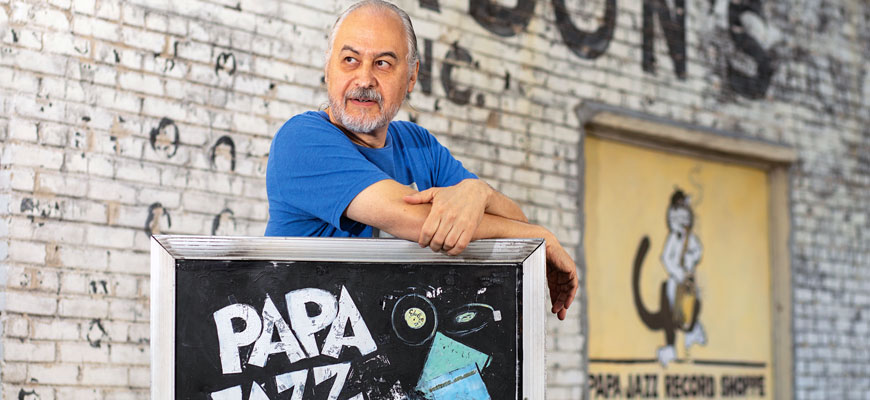
UofSC alums help keep 5 Points alive
Tim Smith turns passion for music into 40-year career buying, selling records
Posted on: December 14, 2020; Updated on: December 14, 2020
By Craig Brandhorst, craigb1@mailbox.sc.edu, 803-777-3681
If you think Five Points is only a college bar district, think again.
The village down the hill has drawn South Carolina students for more than a century, and not simply to celebrate. And for many who settle in the Capital City after graduation, Five Points remains an integral part of their lives.
“It’s an amazingly unique neighborhood, and everybody’s a regular,” says Kelsey Hennighan, executive director of the Five Points Association. “If you come down any given afternoon for lunch, or Sunday for brunch, or even for an early dinner, you see people outside eating, talking, you see people with their dogs — we’re probably the most dog-friendly neighborhood in town.”
Hennighan would know. As director, she coordinates the district’s economic development, beautification and safety efforts — not to mention the annual St. Patrick’s Day celebration. But she also knows the scene, having worked as a hostess at Saluda’s as an undergrad before taking a PR job at Spirit Communications.
“When I applied for the director position, I kind of came full circle,” she says.
Carolinian caught up with five alumni who, like Hennighan, can’t shake Five Points from their system.
Tim Smith — Papa Jazz
As a freshman, Tim Smith lived in the old Honeycomb dorms — Douglas, to be precise — and while college students in 1978 were quicker to head for the bars on Rosewood Drive than Harden Street or Saluda Avenue, Five Points had its own allure, thanks to geography.
“Being downhill from the university kind of made it an automatic destination,” Smith says, the faintest hint of laughter in his voice. “It’s just your natural inclination — ‘Where are we gonna go? Guess we’ll go downhill.’ That sounds almost silly, but sometimes the simplest answer is correct. Of course, we always forgot we had to go back uphill.”
That’s textbook Tim Smith — a philosophical answer from a onetime philosophy major, a guy who also happens to really dig music, particularly bebop and avant-garde jazz. And whether it was gravity pulling Smith’s feet down Greene Street or the lure of sax and drums, sometime sophomore year he landed a job at a then-relatively new record store called Papa Jazz, which had recently moved to its current address from a storefront on North Main.
To me, there are some things — music, art, books, movies — that have a timeless quality. If a record was good in 1967, why wouldn’t it still be good now?
Tim Smith
“I was a customer,” Smith says. “Music was my biggest interest so it was a natural thing, wanting to be around records all the time. I’ve been doing the same thing for 40 years.”
A couple-three years after he first stepped behind the record store register, Smith and fellow Carolina student Harry Palmer bought out the business. “That was either ’82 or ’83,” Smith says. “There were probably half a dozen record stores within a mile, but we were the only used record store.”
The combination of a deep inventory and a knowledgeable staff has served the store well, even as CDs overtook vinyl in the 1990s and, later, as digital files displaced CDs. But while Smith has cut back his hours in recent years, saving a bit of energy for the Five Points Association, even serving a couple terms as president, he hasn’t always had time for extracurriculars.
“Frankly, my first 20 years in business my average work week was probably 75 hours a week,” says Smith. “That’s just the norm. It’s not like, ‘Oh, look at Tim, he really put in the time.’ Anybody that’s self-employed will tell you the exact same story.”
But few people run an operation quite like Papa Jazz, which feels timeless thanks to so many vintage records, the music on the stereo, the conversations at the desk and in the aisles. The layout has shifted to accommodate changes in fashion — in the ’90s, CDs were a dominant fixture — but otherwise the shop looks much the same as when Smith and Palmer took the keys.
They’ve built a loyal customer base, too — “There’s people that have been coming here for 40 years, so we must be doing something right” — with many wandering in, like Smith, as undergrads.
“That’s sort of the age when you’re getting interested in things beyond what you’ve seen on TV or heard on the radio, even what you find on the internet,” he says. “Your mind opens up, your interests are getting wider, whether it’s because of a class you’re taking at USC or you just start to hear about things from other people.”
And the fact that many records students buy at the store predate their birth? That only adds to the allure. “To me, there are some things — music, art, books, movies — that have a timeless quality,” says Smith. “If a record was good in 1967, why wouldn’t it still be good now?”
Share this Story! Let friends in your social network know what you are reading about